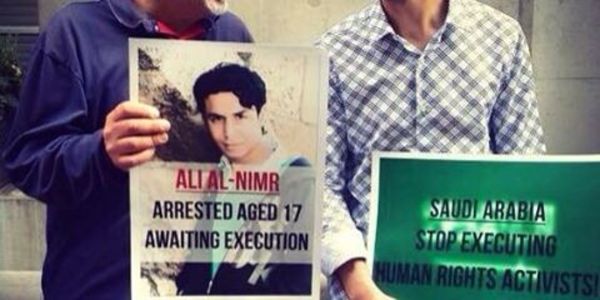As the 13th Annual World Day Against the Death Penalty approaches, the Government of Saudi Arabia has marked its calendar for a separate occasion: the public beheading of two minors. Despite its international obligations under the Convention against Torture and the Convention on the Rights of the Child – and despite its seat on the UN Human Rights Council – the kingdom has recently bared its intent to execute Ali al-Nimr and Dawood al-Marhoon, two pro-reform demonstrators who were just 17 at the time of their arrest. Like countless other prisoners of conscience in Saudi Arabia – and, no doubt, like many of the 134 people executed so far this year – al-Nimr and al-Marhoon have reportedly suffered intimidation, humiliation, and torture at the hands of the security forces. Barring international intervention, they could become two more innocent sacrifices to an insecure monarchy.
In February 2012, Saudi police arrested Ali al-Nimr and imprisoned him for two years without charge. Reportedly, al-Nimr was wanted for his involvement in a series of non-violent protests in the predominantly-Shia Eastern Province. Once in custody, Ministry of Interior (MOI) officials violently interrogated al-Nimr about these rallies, accusing him of participating “in the illegal protest, attacking security forces, possessing a machine gun and committing armed robbery.” After the officials allegedly subjected him to severe physical abuse, al-Nimr admitted to the charges. Though the confession was given under extreme duress, the Specialized Criminal Court (SCC) – the Saudi national security tribunal – cited it as key evidence in al-Nimr’s conviction. In May 2014, the SCC sentenced him to death, a decision upheld by the Saudi Supreme Court. Al-Nimr’s sentencing has been met with international outrage; most recently, the European Parliament adopted an Urgency Resolution condemning the court’s decision and calling on King Salman bin Abdulaziz Al Saud to “grant pardon or to commute his sentence.”
Three months after they detained al-Nimr, Saudi authorities arrested Dawood al-Marhoon for his supposed participation in the same protests. Authorities tortured al-Marhoon, subjecting him to whippings with an iqaal (the rope used to tie the headdress of Saudi men). After a year of this treatment, security forces transferred him to a Mabahith intelligence prison, where the severity of his abuse intensified. According to al-Marhoon’s family, Mabahith officials electrocuted him, hung him from the ceiling by his legs, and beat him as he was tied to a chair. Eventually, they forced Al-Marhoon to confess to vandalizing a pharmacy, breaking a traffic sign, attacking police, refusing to inform on other protestors, and distributing water and ammunition at demonstrations. As with al-Nimr’s case, the SCC was unconcerned with the origin of the confession; it sentenced al-Marhoon to death on 27 October 2014. Saudi courts have denied all subsequent appeals.
These two activists are set to join a growing list of names – of lives – forfeited to a securitized criminal justice system. Between August 2014 and August 2015, the Saudi authorities executed 175 individuals – more than they have in any comparable 12-month period in the last decade. As the government has increasingly prohibited basic freedoms in the name of counterterrorism, its rate of capital punishment has increased apace, ensuring that simple dissent is caught up in the national security dragnet. If this dissent originates in the kingdom’s periphery, in the marginalized Shia communities of the Eastern Province, then the authorities presume guilt – and torture until they’re ‘proven’ right.
This day is an opportunity for the international community to demand Saudi Arabia halt the execution of two minors denied fair trials. Before it’s too late.
Sam Jones is an Advocacy Fellow at Americans for Democracy & Human Rights in Bahrain





